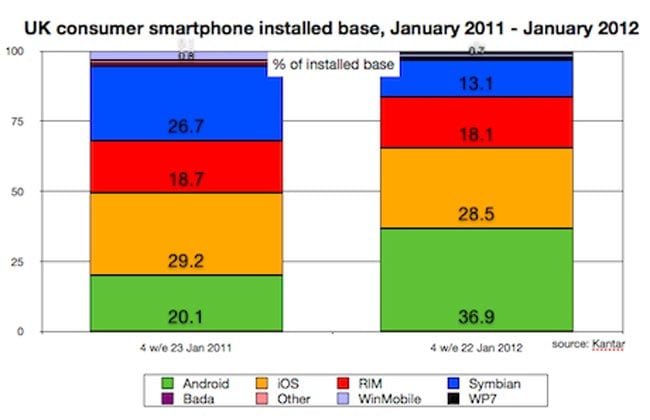According to a recent report by Kantar Worldpanel ComTech, Google’s Android OS is now the most popular smartphone OS in the UK, with a 36.9 percent share of smartphones in use for the four weeks to the 23rd of January 2012.
In second place is Apple’s iOS with a 28.5 percent share of the market, and in third place is RIM’s BlackBerry OS with an 18.1 percent share, with Apple still being the most popular single brand for devices.

Market Dynamics and Trends
The report also says that of new smartphones purchased for the same period, Android devices accounted for nearly half of all devices, Apple’s iPhone accounted for nearly a third of all devices and BlackBerry devices were next with around a 15 percent share of the market. This significant lead by Android can be attributed to several factors, including the wide range of devices available at various price points, which makes Android accessible to a broader audience. Additionally, the open-source nature of Android allows for greater customization and flexibility, appealing to tech-savvy users who prefer a more personalized experience.
Apple’s iOS, while in second place, continues to maintain a strong presence due to its loyal customer base and the seamless integration of hardware and software. The iPhone’s reputation for quality, performance, and user experience keeps it competitive despite the higher price point compared to many Android devices. Apple’s ecosystem, which includes services like iCloud, Apple Music, and the App Store, also plays a crucial role in retaining users.

BlackBerry’s Position and Future Prospects
BlackBerry, holding the third position, has seen a decline in market share over the years. Once a dominant player in the smartphone market, BlackBerry’s focus on security and enterprise solutions has not been enough to keep pace with the rapid advancements and consumer preferences for more versatile and feature-rich smartphones. However, BlackBerry continues to have a niche market among business professionals who prioritize security and productivity features.
The competitive landscape of the smartphone market is ever-evolving, with manufacturers constantly innovating to capture consumer interest. For instance, the introduction of new technologies such as 5G, foldable screens, and advanced camera systems are expected to influence future market shares. Android manufacturers like Samsung, Huawei, and Google are at the forefront of these innovations, which could further solidify Android’s lead in the market.
Moreover, the role of emerging markets cannot be overlooked. As smartphone penetration increases in regions like Asia, Africa, and Latin America, the demand for affordable yet capable devices is likely to boost Android’s market share even further. On the other hand, Apple may continue to focus on premium segments and expanding its services ecosystem to drive growth.
In conclusion, while Android currently leads the UK smartphone market, the competition remains fierce. Apple’s strong brand loyalty and ecosystem, along with BlackBerry’s niche focus, ensure that the market dynamics will continue to shift. The ongoing advancements in technology and changing consumer preferences will play a significant role in shaping the future landscape of the smartphone industry.
Source The Guardian, Into Mobile
Latest Geeky Gadgets Deals
Disclosure: Some of our articles include affiliate links. If you buy something through one of these links, Geeky Gadgets may earn an affiliate commission. Learn about our Disclosure Policy.